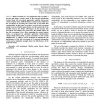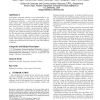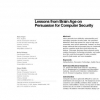948 search results - page 9 / 190 » Making a Game of Network Security |
GECCO
2007
Springer
14 years 2 months ago
2007
Springer
Opponent models are necessary in games where the game state is only partially known to the player, since the player must infer the state of the game based on the opponent’s acti...
CSSE
2008
IEEE
14 years 3 months ago
2008
IEEE
—Risk assessment is a very important tool to acquire a present and future security status of the network information system. Many risk assessment approaches consider the present ...
CCS
2008
ACM
13 years 10 months ago
2008
ACM
A frequently proposed solution to node misbehavior in mobile ad hoc networks is to use reputation systems. But in ephemeral networks - a new breed of mobile networks where contact...
CHI
2009
ACM
14 years 9 months ago
2009
ACM
Users generally have difficulty understanding and managing computer security tasks. We examined Nintendo's Brain Age games for ways to help users remember more secure passwor...
FUIN
2008
13 years 8 months ago
2008
The behavior of rational selfish agents has been classically studied in the framework of strategic games in which each player has a set of possible actions, players choose actions ...



